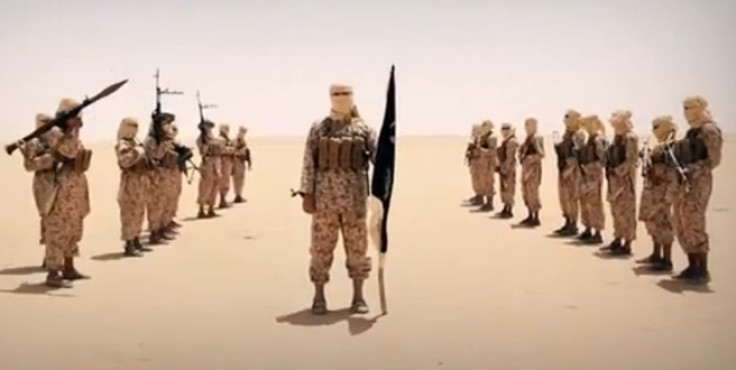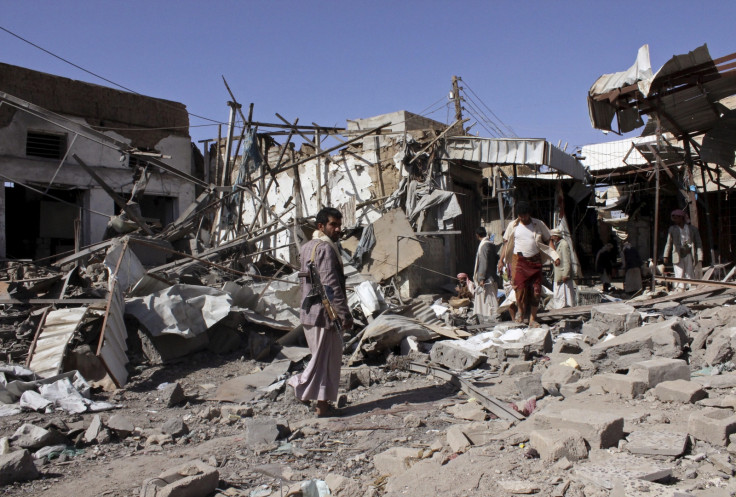Isis: Who is behind the Islamic State's latest franchise in war torn Yemen?

Eighteen men standing in military fatigues in the desert outside what is alleged to be Sana'a, Yemen's beleaguered and heavily-bombed capital city, claimed this weekend to be the latest franchise of the Islamic State (Isis).
If the online video by a group calling itself Wilayat Sana'a is the real deal - and critics have pointed out that the nondescript desert setting could be anywhere in the Middle East - then Yemen will now officially join Libya, Somalia and Nigeria in the dubious accolade of having its own IS brand.
Not that this is the first time that the world has heard of Wilayat Sana'a. The IS-affiliated group claimed responsibility for a brutal mosque bombing in Sana'a in March before the start of the Saudi-led war against Yemen's Houthi rebels.
But behind the rhetoric of throat-cutting and boisterous displays of weaponry in front of black flags with IS insignia, Wilayat Sana'a enter an already crowded radical Islamist marketplace, that has long had an issue with armed militant groups and terrorism.
The prominent of these is Al Qaeda in the Arabian Peninsula (AQAP), by far the most successful branch of the once so infamous Islamist movement started by Osama bin Laden and Ayman al-Zawahiri. Al Qaeda's star may have fallen in recent years with the rise of IS, but in Yemen AQAP has seized cities, airports and oil fields over the past month.
The question of how AQAP will respond to Wilayat Sana'a remains to be seen. AQAP distanced itself from the March attack in Sana'a and Al Qaeda has generally rejected IS. As a well-established actor in Yemen with hundreds of members and the support of major Sunni tribes, AQAP is unlikely to see 18 men in a YouTube video as a major rival.

But equally, Yemen is still reeling from a Saudi Arabia-led onslaught over the past four weeks that has only sought to increase sectarian tensions by pitting a Sunni alliance of states against Houthi rebels of the Shia faith. AQAP had exploited sectarian tensions in the weeks leading up to the war with a series of bombings, and Wilayat Sana'a rhetoric in its video suggests it will do the same.
"We have come to Yemen, with men hungry for your blood to avenge the Sunnis and take back the land they have occupied," one of the militants said.
'The AKM-S assault rifles carried by the men, although functional and well maintained, show some signs of use [and] in the background, militants drive what appear to be late-model vehicles.'
Other than the well-rehearsed sectarian views of its narrator, consultancy Stratfor issued a report that used the video released on April 24 to draw other information about IS in Yemen. It used the footage to draw conclusions about its weaponry, equipment and fighters and what, if any, threat they represent to Yemen.
"The video is interesting for a number of reasons. First, the men are wearing matching uniforms consisting of sandals, rifles, load-bearing equipment and turbans. The uniforms are very similar in design to those featured in Islamic State videos from Iraq and Syria," the report said.
It added that while in other videos from more active war zones such as Syria and Iraq, even slick production techniques would not be able to hide sweat-patches or fading from the sun that would tend to stain pants, tunics and turbans. In the Yemeni video, equipment and uniforms are "in pristine shape with unscratched buckles and new shoulder padding".
"However, the AKM-S assault rifles carried by the men, although functional and well maintained, show some signs of use [and] in the background, militants drive what appear to be late-model vehicles," it added.
Stratfor considers from the military drills that are recorded on the video that the men are well-trained, tactical movements being realistic and practical and with trainees "demonstrating sound marksmanship fundamentals" although committing a military faux pas by "walking while firing their PKM machine guns".

As for Wilayat Sana'a motives for its recent propaganda video, it could be financial. Analysts have previously told IBTimes UK that the motive for Boko Haram and al-Shabab's declarations of allegiance to IS were in order to drum up support from terror financiers in an increasingly crowded jihadi market.
Like any investors, terrorist financiers are driven by geo-political events, and as IS begins to falter in Iraq in the face of a Western-backed bombing campaign and an Iraqi army onslaught, perhaps Yemen will prove a better option for those wanting to put their funds into global jihad.
'Similar to other locations outside of Iraq and Syria, affiliation is murky--and difficult to tell if it's in name only, or there is some command and control aspect.'
But just like it is almost impossible to trace the money behind the group in a country like Yemen, it is equally difficult to understand how Wilayat Sana'a fits in to the global IS framework as it is in most states where IS has a presence outside of its Levant stronghold.
"Similar to other locations outside of Iraq and Syria, affiliation is murky--and difficult to tell if it's in name only, or there is some command and control aspect," said Robert McFadden, senior vice president of the Soufan Group.
But whoever is behind Wilayat Sana'a and whether the group is more of a threat than its relatively small numbers suggest, the resurgence of a sectarian ideology in a fragile Yemen is undoubtedly a turn for the worst. One thing that has united IS in Iraq and Syria and all its other various groups and affiliates is a propensity for the kind of violence that even Al Qaeda has shunned.
"Affiliation is not nearly so important as the motivation to violence that IS [...] stimulates in extremists," he said.
A devastating and short-sighted war has drawn up new battle lines in a state that has long prided itself on escaping the sectarian violence that has defined its neighbours. IS in Yemen suggests that those days may be over.
© Copyright IBTimes 2024. All rights reserved.






